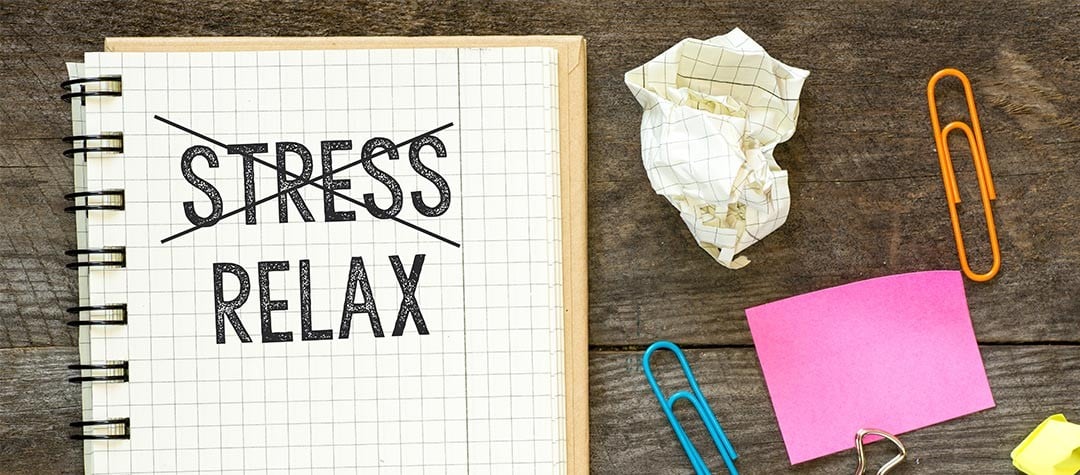Check out our top 10 common causes of stress and solutions to help you beat each of these worrisome stress factors.
Stress is usually caused by too much pressure being put on us by others — or in some cases by ourselves — and if stress is left unchecked, it can lead to an inability to function effectively and cope under pressure. Here are some of the most common causes of stress with solutions and strategies on how to overcome them.
1. Not having enough time
Frequently you can be running around all day trying to balance all your tasks at work and at home, yet still not manage to tick everything off your list. Sometimes this can be due to the demands that are placed upon you being unrealistic, but often it simply comes down to poor time management and not setting your priorities .
Solution: Learn to manage your time more effectively
It may sound obvious, but better time management really can reduce your stress. Many of us waste a lot of time doing unimportant tasks — so make sure you always prioritise your day and do the important jobs first. Also, do the jobs that you don’t want to do before moving onto the more pleasant tasks, as just thinking about unpleasant jobs can cause stress.
2. Unhealthy lifestyle
While some people might adopt an unhealthy lifestyle due to lack of time — for example by turning to fast food because they haven’t time to eat properly — others may have an unhealthy lifestyle because they are already stressed — for example by turning to smoking as coping mechanisms. Whatever the reason, an unhealthy lifestyle can reduce your ability to cope with stress, and in some circumstances it may actually increase your stress levels.
Solution: Make small changes towards a healthier lifestyle
Having a healthy diet, doing regular exercise, and getting enough sleep means that your body will be able to cope with the stress that is thrown your way. Exercise in particular can be great for stress relief — especially if it involves taking your stress out on a ball or other inanimate object! Also, by knowing you’re leading a healthy lifestyle, you’ll be in a more positive frame of mind and will be better able to cope.
3. Taking on too much
You may have a tendency to take on too much both at work and in your home life, perhaps because you don’t want to let people down. If you do this, however, it will frequently lead to you stressing about having too much to do and not managing to achieve everything you have taken on. Trying to take too much on will also mean you won’t be able to give what you do your best.
Solution: Know your limitations and don’t take on too much
It’s better to be honest and tell people what your true limitations are. This way, you can avoid getting unnecessarily stressed by not taking more on than you can comfortably handle at any given time. It’s better to be slightly cautious rather than end up doing more than you should be doing — and remember: it’s not a sign of weakness to ask for a helping hand, so seek help if you need it.
4. Conflicts in the workplace or at home
If relationships are strained at home or in the workplace, then it’s more than likely that you’ll be stressed about them. Conflicts might occur due to disagreements about how things should be done — and so you might feel that you have to stand your ground to make progress — but ultimately a lot of hot air will only contribute to your stress levels.
Solution: Avoid unnecessary conflicts
While arguments may not wholly be avoidable, it makes sense to steer clear of or prevent conflicts whenever possible. There’s no need to be argumentative or confrontational; simply try to arrive at a solution that both parties are reasonably happy with. Always remember that frank discussion is better than bitter dispute.
5. Inability to accept things as they are
Some people don’t have the ability to accept things as they are or realize that certain situations are out of their control. If you try to change something that you really can’t change, then you’ll just be creating unnecessary stress that you can do without. Plus, all that time spent stressing about it means you’ll be unable to concentrate on the other things that you could be doing — which may make you even more stressed.
Solution: Accept the things you can’t change
Changing a difficult situation is not always possible, and if that’s the case then it is best to accept and come to terms with the fact that you can’t do anything. It may help to talk a situation over with somebody else, as they may be able to help you see it in a more positive light or from a different and less stressful perspective. Talking over things can help to prevent your perception of a situation from getting out of proportion.
6. Failure to take time out and relax
Being constantly on the go means that you will be in a heightened state of tension all the time and your body will never have the chance to get rid of your stress. Failing to take time out will also reduce your effectiveness in the long run.
Solution: Take time out and recharge your batteries
Taking a break may mean that you can perform much better afterwards, and as such you will easily make up the time you have used for relaxing as well as feel more refreshed. Even just ‘taking five’ can recharge your batteries and give you greater clarity of thought. Relaxation will help your body return to its normal healthy state.
7. Non-work-related issues
Stress may be caused by a non-work-related issue such as a serious illness in the family, having to care for dependents, a bereavement, moving house, or debt problems. Often these issues are unavoidable and not something that you can readily deal with — but it’s worth trying to deal with them rather putting them off or trying to ignore them.
Solution: Take time off or change your working practices
If such issues are causing you stress and an inability to do your job, then it may be best to take time off to deal with the issues. If there’s an ongoing problem, then you could try to approach your employer to ask for more flexible working arrangements — which may allow you to cope better with those issues.
8. Failure to see the humour in situations
Some people are often able to laugh in the face of adversity and seem to be able to brush aside problems and deal with them effectively. They essentially don’t allow themselves to become overly stressed. However, other people may not see the humour in some situations, and this may cause them to become more stressed.
Solution: Harness the power of laughter
Adopting a humorous view towards life’s situations can take the edge off everyday stressors.
Not being in ‘serious mode’ all the time can help you to have clearer thinking — and laughing has been clinically proven to lower blood pressure and reduce stress hormones. So, try to see the funny side of things among these other instant health boosting ideas .
9. Particular situations that cause stress
Becoming stressed in some situations is sometimes unavoidable, and inevitably there are situations in which we can expect to be stressed from time to time, such as in the workplace or when you’re stuck in traffic and you need to get somewhere quickly.
Solution: Avoid situations that place you under stress
The way to avoid or minimise some of the stress you may be under is to stay away from situations that stress you out. For example, if you get stressed when you shop in the supermarket, try doing your grocery shopping online instead. If, however, a stressful situation is unavoidable — such as being in the workplace — then try to follow some of the other tips in this article, which will help to ease your stress.
10. Cause of stress: Major life changes
Significant changes in things that we have become accustomed to can be a real cause of stress. For example, changing your job or moving house may be among the most stressful things you will do in your lifetime — which is possibly why most of us try to do it infrequently! Also, the process leading up to the change may be stressful in itself.
Solution: Welcome change as a challenge
If you see change as a positive rather than a negative challenge, then any stress that accompanies the change will be less likely to affect you. A new job or new home, for example, should be viewed as new beginning, and should be something to look forward to rather than fear.
Preventing stress …
There are many causes of stress, as we have seen, but by following some of the solutions suggested here, you should be better able to deal with stress when it arises. Alternatively, if you avoid or deal the causes of stress that we have outlined, you could even avoid stress before it occurs!














